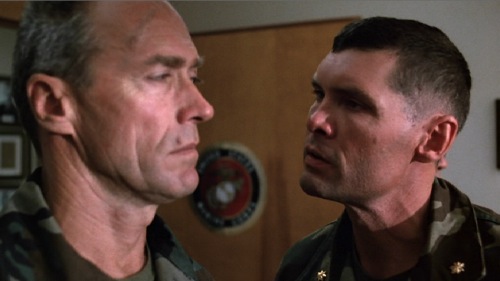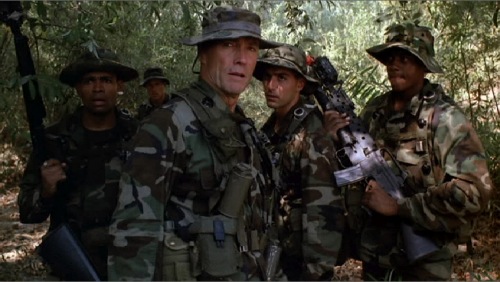Welcome to Retro Television Reviews, a feature where we review some of our favorite and least favorite shows of the past! On Sundays, I will be reviewing the made-for-television movies that used to be a primetime mainstay. Today’s film is 1981’s We’re Fighting Back! It can be viewed on YouTube!
We’re Fighting Back opens with a title card informing the viewer that the film that they are about to see is based on a true story and that the characters are based on the Guardian Angels, a group of New Yorkers who took it upon themselves to patrol neighborhoods and the subways. However, the film’s plot is fictionalized and all of the names have been changed and basically, the entire story is made up. It gets the film off to a strange start. This film is based on a true story, except that it’s not.
Morgan “Case” Casey (Kevin Mahon) is a young man living in New York with his father. When his father is mugged in the subway and ends up in the hospital, Case decides to take it upon himself to patrol the trains. He recruits his co-workers at the local hamburger place. Benny (Ramon Franco) says he is streetwise. Ling (Brian Tochi) claims that he’s good at fighting. Preacher (Paul McCrane) …. well, I’m not sure what Preacher’s special skill is but he’s recently moved to New York from Alabama. Case and his friends lose their first big fight against a gang of muggers, which leads to Case yelling at all of them and announcing that they need to recruit more members and get trained up on how to fight. Preacher thinks that Case is putting everyone’s life in danger but Case is determined to clean up the neighborhood.
Teaming up with some former gang members, Case forms the organization that will become the Guardian Angels. Among those who join are a tough waitress named Chris Capoletti (a young Ellen Barkin) and a Hungarian immigrant named Janos (an equally young Stephen Lang). At first, attorney Elgin Jones (Joe Morton) thinks that Case and his organization are going to be a bunch of lawless vigilantes but, after meeting Case and seeing Case refuse to allow an obvious psychopath to join the group, Elgin decides to become a part of Case’s anti-crime crusade.
And …. well, that’s pretty much it. There’s not much of a plot here. Case and Preacher are briefly estranged but they are friends again by the end of the movie. Eventually, Case faces off with Tony (John Snyder), the gang leader who mugged his father. For the most part, though, this is a film without much real conflict. In this film’s portrayal of urban crime, it turns out to be remarkably easy to clean up a neighborhood. Apparently, you just need to get a bunch of people to give a damn. One watches the movie and wonders why no one ever came up with this extremely simple solution in the past. The film goes out of its way to tell us that Case is not some sort of Charles Bronson-style vigilante but Case never has to face any muggers as dangerous as The Giggler. If Case lived in the Death Wish 3 neighborhood, who knows what type of approach he would have gone with.
Under the best of circumstances, this film would seem simplistic. Watching this film after the past few years, in which we’ve seen an increasing number of unarmed people getting hurt and killed by self-appointed vigilantes who felt that they shouldn’t have been in their neighborhood or train car, it’s hard not to feel that We’re Fighting Back is incredibly naïve and rather irresponsible. (The Death Wish films are so shameless and over the top that they’re difficult to take seriously as any sort of manifesto. We’re Fighting Back plays out with all the earnestness of a call to action.) Need to clean up your neighborhood? Just do it yourself! Just fight back! Obviously, that’s an idea that appeals to a lot of people but, in reality, it rarely seems to work out the way that it should.

 The year is 1983 and things are looking bad for the Second Marine Division of the U.S. Marine Corps. The officers are almost all college graduates like Major Powers (Everett McGill) and Lt. Ring (Boyd Gaines), men who have never served in combat but who are convinced that they know what it means to be a Marine in the 80s. Convinced that they will never have to actually fight in a war, the latest batch of recruits is growing soft and weak. All of the slackers have been put in the Recon Platoon, where they are so undisciplined that they think that wannabe rock star Cpl. Jones (Mario Van Peebles) is a good Marine. MARIO VAN PEEBLES!
The year is 1983 and things are looking bad for the Second Marine Division of the U.S. Marine Corps. The officers are almost all college graduates like Major Powers (Everett McGill) and Lt. Ring (Boyd Gaines), men who have never served in combat but who are convinced that they know what it means to be a Marine in the 80s. Convinced that they will never have to actually fight in a war, the latest batch of recruits is growing soft and weak. All of the slackers have been put in the Recon Platoon, where they are so undisciplined that they think that wannabe rock star Cpl. Jones (Mario Van Peebles) is a good Marine. MARIO VAN PEEBLES!
